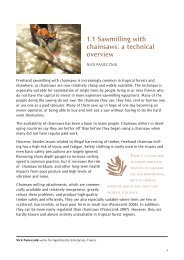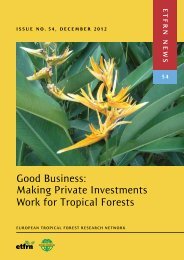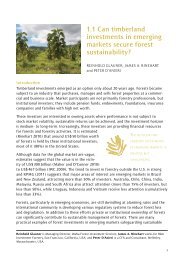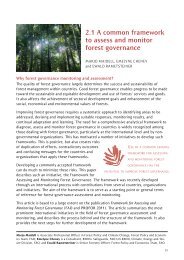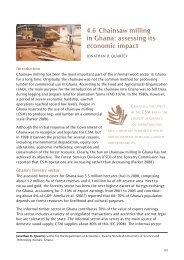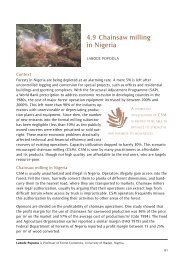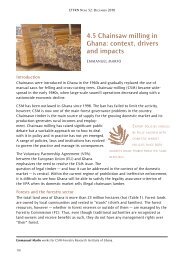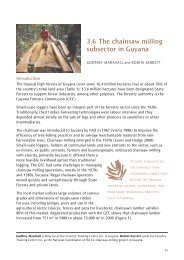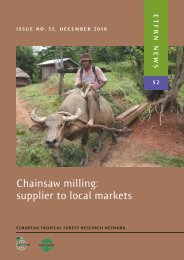Chainsaw milling: supplier to local markets - European Tropical ...
Chainsaw milling: supplier to local markets - European Tropical ...
Chainsaw milling: supplier to local markets - European Tropical ...
Create successful ePaper yourself
Turn your PDF publications into a flip-book with our unique Google optimized e-Paper software.
ETFRN NEws 52: DEcEmbER 2010<br />
These norms play different roles in the traditional corporate forestry regime and the<br />
decentralized forest governance regime. The traditional regime mainly focuses on the<br />
first two categories of legal principles, and, in some cases, the labour rights of timber<br />
industry workers. but this regime does not include regulations on benefit sharing with<br />
<strong>local</strong> communities or on recognizing forest access rights of <strong>local</strong> people. These issues are<br />
the focus of decentralized forest governance regimes. They also provide a basis for<br />
explicitly incorporating artisanal timber production systems in legality schemes.<br />
The FlEGT programme mainly considers norms that relate <strong>to</strong> formal exploitation rights<br />
for cutting specified quantities of formally recognized timber species in designated forest<br />
locations, and <strong>to</strong> payment of forest exploitation and timber trade duties. This interpretation<br />
of timber legality is rather narrow and basically refers <strong>to</strong> norms considered under the<br />
traditional corporate forestry regime. FlEGT pays scant attention <strong>to</strong> the emergence of<br />
new norms as reflected in the development of the decentralized forest governance<br />
regimes. hence, no explicit attention is paid <strong>to</strong> the legality of artisanal timber production.<br />
Different approaches <strong>to</strong> law enforcement<br />
The different interpretations of the norms <strong>to</strong> be considered in linking timber legality<br />
and governance are reflected not only in the types of norms <strong>to</strong> be considered, but also<br />
in how they should be enforced. Colchester et al. (2006) distinguish two types of law<br />
enforcement:<br />
• hard enforcement in the form of legal enforcement of existing forestry laws,<br />
including criminalization of viola<strong>to</strong>rs through arrests, the filing of charges, court<br />
judgments and the imposition of punishments; and<br />
• soft enforcement in the form of providing incentives for law adherence or<br />
administering symbolic penalties.<br />
The first approach is based on strict legal considerations; the second on social considerations.<br />
For instance, the second approach addresses the need <strong>to</strong> develop appropriate and<br />
accountable systems in respect <strong>to</strong> juridical services for dealing with legal infringements.<br />
such systems concern arrangements for access <strong>to</strong> legal courts and arbitrage services, and<br />
attention <strong>to</strong> social safeguards that prevent legal requirements from having undesired social<br />
effects. They also include effective governance arrangements that enable inadequate<br />
legal regulations <strong>to</strong> be improved.<br />
soft approaches <strong>to</strong> law enforcement are particularly relevant in decentralized forest<br />
governance regimes, since explicit attention is given <strong>to</strong> improving the livelihoods of<br />
forest dependent people. To accomplish this, law enforcement should focus not only on<br />
adherence <strong>to</strong> official regulations on benefit-sharing, but on social safeguards in the form<br />
of measures <strong>to</strong> minimize possible adverse impacts on forest fringe communities and<br />
labourers in timber industry (kaimowitz 2003; owusu et al. 2010).<br />
208



